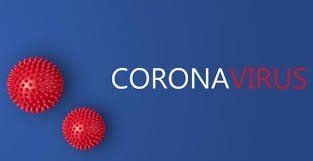This is an automatically translated article.
An acute respiratory infection caused by a new strain of corona virus (COVID-19) broke out strongly in the world, especially in the center of Wuhan (China). Covid-19 has affected the global economy, including the tourism industry with a large number of canceled tours. On February 15, 2020, the World Health Organization WHO issued advice and answers about covid-19, helping people arrange their travel plans.You can refer to the sections of the document including:
[Q&A about the 2019 Corona virus] Part 1: Origin and mode of infection [Q&A about the 2019 Corona virus epidemic] Part 2: Do How to protect yourself against disease? [Q & A about the 2019 Corona virus epidemic] Part 3: When to get tested? Instructions for taking care of people suspected of being infected with 2019 nCoV at home Q - Answers about the 2019 Corona virus epidemic] Part 4: How is 2019-nCoV spread? Is it possible to get it from animals or pets?
RECOMMENDATION ON MOVEMENT
Should we cancel our travel trip? No, because throughout this epidemic, WHO has emphasized that we should not impose any restrictions on commercial travel, including all parts of China. The risk of infection in other countries is low. The center of this epidemic is in China's Hubei province. A few countries have implemented isolation with people returning from epidemic areas. This is based solely on their own risk assessments.
Travelers should not cancel their plans, however you should consider the travel restrictions that airlines are in place.
Is the environment in the cabins dangerous too? No, absolutely not. We know that the virus is transmitted through droplets, which is close contact with infected people who are spreading the virus. Viruses can also survive on surfaces but only for a short time
The best thing to do inside the cabin is to practice proper hand hygiene, washing hands properly with soap and water or using hand sanitizer. alcohol-based hand sanitizer, and strictly follow recommended measures when coughing or sneezing, keep a distance from people who are coughing or have other suspected symptoms
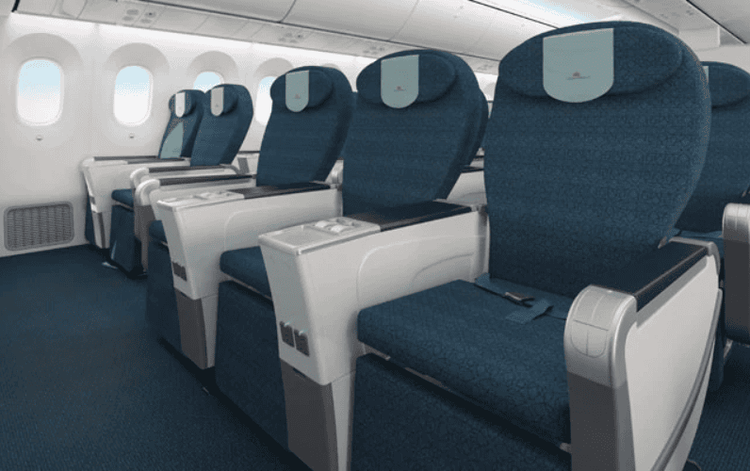
Khoang máy bay được vệ sinh sạch sẽ
What should people working on planes and ship crews do to prevent Covid-19? Airline workers and ship captains should take the same precautions as passengers. In addition they should be aware of the guidelines for airline aircraft issued by IATA i.e. the Aeronautical Association.
They should also have beds and other requirements to take care of suspected cases on board. And they have specific guidelines for isolating suspected cases, which means keeping them away from other passengers. It could be providing suspected passengers with essential supplies, providing them with papers and special places for passengers who are sick...
What precautions should be taken against airline staff? Airline staff should practice the same hygiene measures as everyone else. We now know that viruses can survive for up to half an hour on surfaces. There is no concrete evidence that the virus can be transmitted by touching other people's luggage
Therefore they should be aware of procedures for airport locations in accordance with surveillance standards international
Airline personnel should protect themselves with the methods we just mentioned above.

Nhân viên hàng không nên bảo vệ chính mình khỏi dịch bệnh
What backup do I need if I stay in a hotel room while I'm traveling? Staying in a hotel room is like any other personal protection measure, so you should wash your hands often with alcohol-based hand sanitizer, make sure your food is hygienic, and don't leave any residue behind. What specifically do you mean by staying in a hotel compared to other places when you travel?
Like any other routine protection for the public or for travelers should be in place for any of the respiratory infections we mentioned above.
Should I avoid crowded places like airports in general? If you want to travel, of course you have to go to the airport. However, if you want to reduce your risk of getting infected, staying away from people with possible suspected cases can help reduce your risk.
If I'm on a plane with someone infected with covid-19, what should I do? As a passenger, if someone on your plane is suspected of having coronavirus, the crew is made aware of the virus and the necessary procedures, they will ask all passengers to sit 2 rows behind. the back or the front 2 rows fill out a form they call a personal location form, this is a form where you give your contact details in case the government needs to contact you if you do. the need to contact as in the case of a suspected case on the plane that has tested positive.
They will then contact you in case of necessity, you will be taken preventive measures and monitored for 14 days for symptoms such as cough, shortness of breath, or fatigue...

Hành khách được kiểm tra thân nhiệt tại sân bay
So what about cruise ships? Should cruise travel plans be cancelled? No, it's the same for planes
If the ship has taken precautions to travel abroad, they are likely to be aware of suspected cases on board, those trains should not cancel.
We have been in discussions with the International Maritime Organization as we are aware that some ships are currently in dire straits as cases of covid-19 have been detected on these ships and WHO is in discussions with leadership of the International Maritime Organization on how to best handle the situation of passengers on these ships.
How to protect the baby on the plane, and the situation is that the baby can't wear a mask? Babies need to be protected by their parents in the same way that parents are protecting themselves, stay away from people who may have symptoms of covid-19 like coughing or sneezing, try to keep the baby close to the mother or both parents, to keep the baby out of contact with suspected people on the plane.
What is the risk of the crew in a closed cabin, clean restroom, in close contact with passengers? Yes, cabin crew must protect themselves first if they suspect suspected cases of infection on board, they must also have the necessary equipment for self-protection and the necessary equipment for protection. additional passengers and these contingencies need to be met with Vyatta's international standard procedures.
Therefore, before traveling, cabin crew should make sure they have enough protection for themselves and for those who may get sick.
See full advice from Dr Carmen Dole, Head of Secretariat for International Regulations, WHO:
Coronavirus outbreak: Do you need to cancel your tour?
Is it safe to travel to some Asian countries like China, Singapore, Thailand? In China, the province with the highest number of cases, measures have been taken by the Chinese government to protect its citizens and prevent the transmission of the virus to other regions. Therefore, when traveling to these regions, people should avoid going to areas where travel restrictions are in place.
For other countries it is safe to travel with the usual precautions, but it is important to check your airline, as we know some airlines have reducing or suspending flights in some Asian countries and we are monitoring this information very closely
Is the air in the plane safe? Can the virus be transmitted by aerosol? Cabin air is essentially a special system capable of ventilating the cabins of an aircraft. The virus is only transmitted through droplets, not through the air.
In-flight sinks and bathrooms, are they safe? They are safe as long as you take reasonable precautions. You wash your hands properly when going to the bathroom, you use an antibacterial or alcohol-based hand sanitizer to clean your hands if necessary.
People need to carry alcohol or disinfectant products, can airport security allow passengers to carry more than 100 ml in their hand luggage? That's the question we need to discuss with our WHO colleagues at IATA
Currently, these alcohol products are available in small bottles of about 100 ml and really don't need much more than that. a long trip, that's all we can answer at the moment.
Recommended video:
Sanitize hands properly - reduce the risk of corona virus infection 2019
I see a group of Chinese people, should I be worried? No, the virus originated in China in a province in China, and the Chinese government is taking effective measures to protect the world from the spread of the virus. That means other Chinese provinces are not at high risk. People from a country should not be discriminated against or discriminated against just because that country has a province that is experiencing a major outbreak.
RECOMMENDATION ON THE PREVENTION OF COVID-19 MEDICINE
Covid-19 is airborne or is it just droplets? It is drops. The virus can be spread through droplets from someone who is coughing or sneezing and who is in close contact with that person. Currently to our knowledge it is not airborne.
Are recommendations for prevention of covid-19 any different from those for seasonal flu? It is not at all different from the recommendations given for seasonal flu, people should practice good practices regularly to protect from respiratory illness. Includes practicing cough or sneeze protection, making sure you blow your nose or cough into your elbow, using a tissue when you blow your nose or cough, and throwing it in the trash
Sure that your hands are clean and that food preparation follows food hygiene practices on a regular basis.
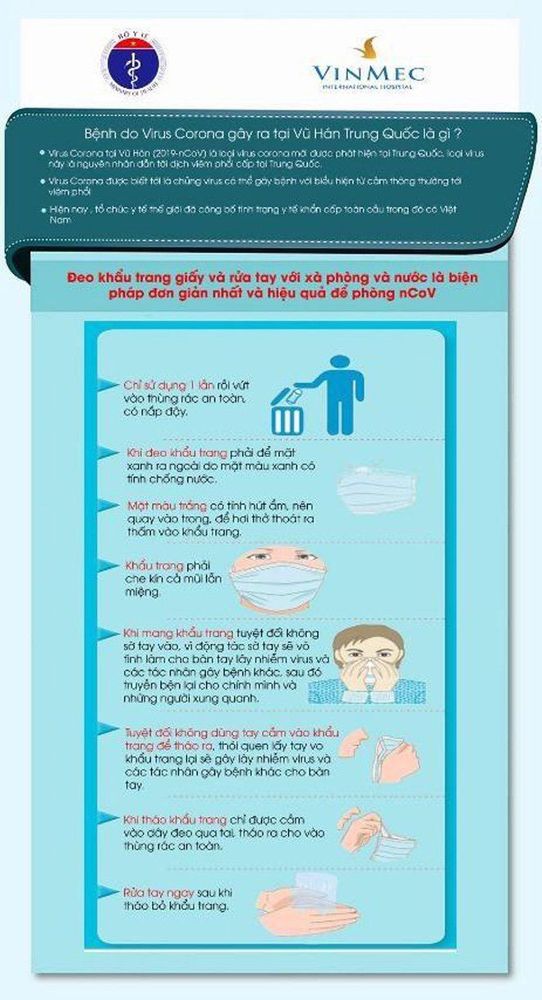
Một số khuyến cáo về phòng chống dịch bệnh
Is it enough to just wash your hands with tap water or do you have to wash them with antiseptic products or alcohol-based hand sanitizers? And how often should you wash your hands? You should wash your hands when your hands come into contact with dirt. For dirty hands, you use soap and water and you wash them properly as you would for any kind of hand hygiene measure.
If your hands are not dirty, you can simply use alcohol sanitizer. So it doesn't matter how many times a day you wash, but as long as you need to maintain proper hand hygiene.
A lot of people are using masks. How effective is wearing a mask? Masks are effective for sick people, preventing them from spreading the virus, or spreading the virus to the ward. For people who are not sick, masks are not really effective.
It is very important that you make sure that you use the mask properly, do not touch the outside of the mask even if you are not sick. Masks are important for those taking care of passengers or special passengers, or sick people, medical staff. It is especially important that those who need masks most have masks to use.
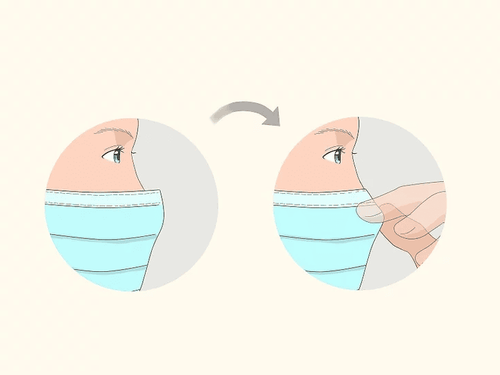
Khẩu trang cần được đeo đúng cách
When is it mandatory to wear a mask? Can't wear a mask? Many people have a hard time wearing masks, while others do not. Masks are very important to people who are sick because it prevents them from infecting others
People need to wear masks to protect themselves but like we said, it doesn't really protect people who are not sick. Even if you decide to wear a mask, you should know how to put it on properly, how to put it on, how to take it off
So don't get infected by touching the mask when unnecessary.
We have also learned that many people who have returned from China or some other place are asked to isolate or self-isolate at home to test or self-monitor for symptoms for 14 days. If you have symptoms during this time, you need to call emergency medical services immediately, and if you go to a medical facility, you need to wear a mask, so as not to infect others and your friends. are accompanying. Because if you have symptoms, you probably already have the disease.
If I have been in close contact with someone with coronavirus 2019 what should I do? If you know that you have been in contact with someone diagnosed with coronavirus, you should self-monitor for symptoms for 14 days because you may have been infected, you may have contracted the virus from someone who has tested positive.
While watching for symptoms as we said, check your temperature in the morning and evening to see if you have a fever, shortness of breath or any other symptoms such as cough. Contact your medical facilities, wear a mask when you get there and make sure you don't come into contact with other people in case you suspect that you may also have been infected
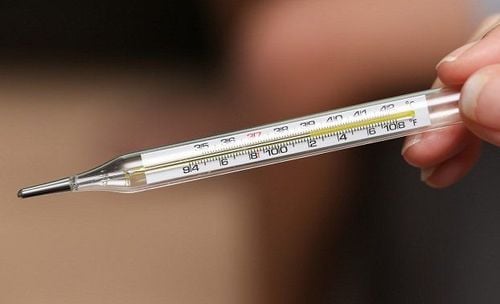
Kiểm tra thân nhiệt vào buổi sáng và tối
How far should we keep to avoid contact with droplets? We have advised a distance of one meter which is what we can advise you at this time, when coughing is closer than 1 meter, droplets can stay in the air and they can be transmitted and inhaled by people you're talking to or with people nearby.
How many days is the incubation period of this virus? The maximum incubation period is 14 days, but studies show it can be from 2 to 5 days, but the maximum is 14 days.
Can we catch the virus without any contact with the infected person? No, people who are infected, they can transmit the virus, the people they have symptoms, they can transmit the virus. No patient is asymptomatic. Even people who do not show immediate symptoms such as coughing or sneezing, they still have some minor clinical symptoms such as fever, and these are the cases we are currently studying.
And those cases can transmit the disease, but it can't be people who are completely asymptomatic. So, in order for a person to be able to transmit the virus, they must have certain types of symptoms
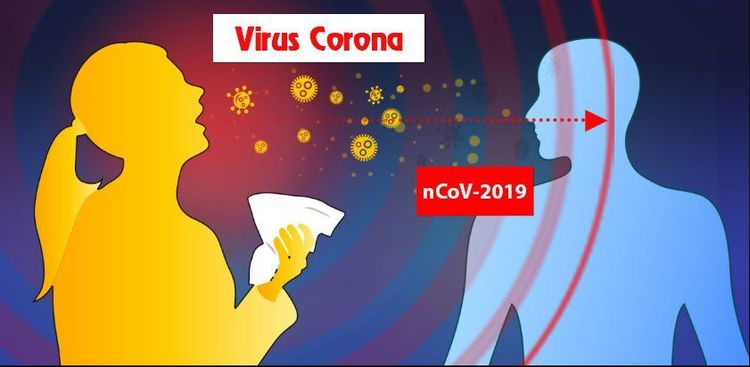
Virus corona covid-19 truyền bệnh qua giọt bắn
How long do droplets last on the surface of objects? We know that viruses can survive for about 30 minutes on surfaces etc. but we also know that with proper protection, hand hygiene can even prevent virus transmission from contact surfaces
Respondent: Dr Carmen Dole - Head of the Secretariat on international regulations - WHO
MORE:
[Q&A about the 2019 Corona virus] Part 1: Origin and mode of infection [Q&A about the 2019 Corona virus epidemic] Part 2: How to protect Protect yourself against disease? [Q & A about the 2019 Corona virus epidemic] Part 3: When to get tested? Instructions for taking care of people suspected of being infected with 2019 nCoV at home Q - Answers about the 2019 Corona virus epidemic] Part 4: How is 2019-nCoV spread? Is it possible to get it from animals or pets?




![[Q&A about the 2019 Corona virus epidemic] Part 4: How does 2019-nCoV spread? Is it possible to get it from animals or pets?](/static/uploads/small_20200204_141656_397082_theo_doi_than_nhiet_max_1800x1800_jpg_9276350bb5.jpg)

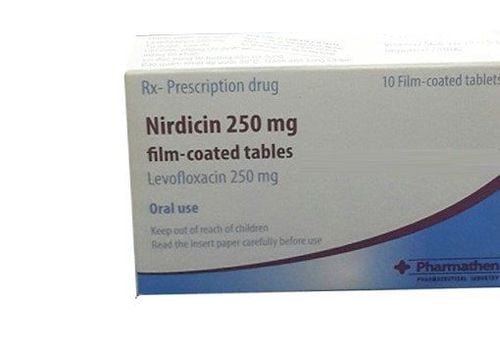

![[Q&A about the 2019 Corona virus epidemic] Part 6 Advice for the community: Misconceptions](/static/uploads/small_20200207_154556_326926_ai_co_kha_nang_bi_b_max_1800x1800_png_fce40010b3.png)
